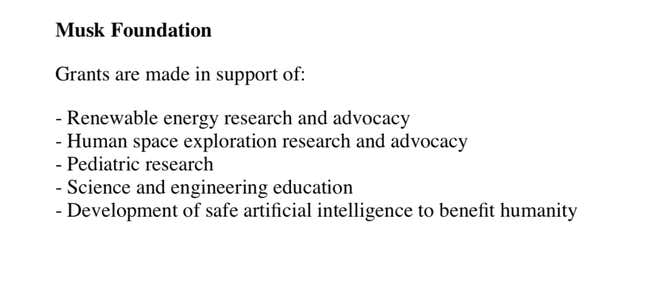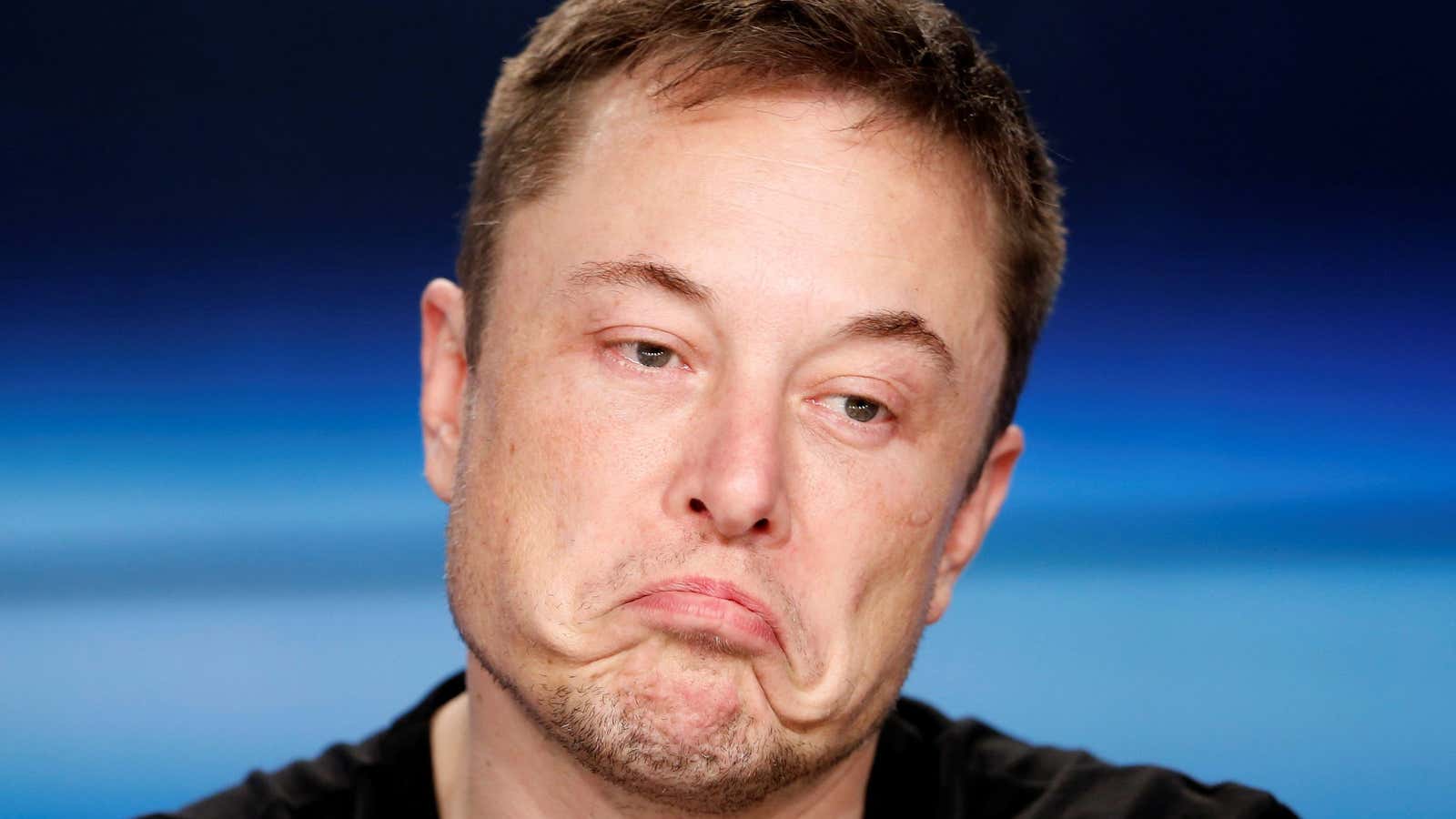Elon Musk is known for spending billions of dollars to build better electric cars and bigger rockets. Since 2008, the Tesla CEO has spent more than $80 billion just rolling out the electric carmaker’s first three models, according to public financial filings.
But when it comes to giving money away, the billionaire and head of the Musk Foundation is in a bit less of a hurry.
Founded in 2002 by Musk and his younger brother Kimbal, the Musk Foundation is a private 501(c)(3) nonprofit. Kimbal Musk serves as secretary, treasurer, and board director, while the elder Musk serves as president and the sole funder, having started the organization with $2.5 million in 2002.
Each year, nonprofits like the Musk Foundation disclose their assets and donations to the IRS as paper or digital filings. Quartz assembled nearly two decades of IRS filings to analyze the foundation’s finances. The picture shows a foundation giving away dozens of small donations in its early years to Elon Musk’s pet causes, before changing its strategy as its assets rose to more than a quarter-billion dollars.
Between 2002 and 2015, the foundation gave away an average of $493,801 per year, with assets dropping to $57,000 in 2015. But the balance increased dramatically the next year with Musk’s contribution of 1.2 million shares of Tesla stock, kicking off a string of substantial donations—most of them to financial institutions that began managing his philanthropy.
So far, Musk has donated at least $257 million to the foundation, most of it Tesla stock. And its grants have increased in turn: Between 2016 and 2018, the Musk Foundation distributed $65 million, somewhat more than the minimum (5% of assets) the foundation must disburse annually to avoid IRS penalties. The foundation’s most recent filings (tax year 2017) show most of the contributions have gone to about 200 nonprofits focused on education, healthcare, community service, environment, and space.
Most of the foundation’s grantees have received small contributions. The median amount is $10,000 and approximately 20% of the funds went to research, technology, and community services, in line with the Musk Foundation‘s mission as stated on its bare-bones summary on its (Yahoo!-hosted) website.

Over time, IRS records show Musk’s giving has shifted toward the intersection of his business interests and his home base in Los Angeles. In 2012, he gave $8,750 to the neurosurgery researchers at the University of California, Los Angeles (Musk’s company Neuralink is seeking to build a direct computer-brain interface), $10,000 to the Los Angeles Police Foundation, and $25,000 to The Rose Foundation for Angelenos against Gridlock (traffic is one of his bugbears).
Generally, the foundation’s causes have fallen left of center, including a $2,500 donation to the Transgender Law Center and $19,200 for the William J. Clinton Foundation in 2011. But he’s also given to right-wing organizations such as the Cato Institute, a $5,000 donation in 2007 to “promote public policy based on individual liberty [and] limited government” and the conservative National Taxpayers Union Foundation in 2005. You can search every one of them in the table below.
But all of these sums are dwarfed by donations to just three organizations: a $10 million donation to YC.org, a research group set up by the Silicon Valley accelerator Y Combinator (run by Musk’s collaborator on OpenAI, Sam Altman) with the aim of “making grants to other 501(c)(3) initiatives and activities that are trying to solve the world’s problems,” and two donor-advised funds ($50 million) run by Vanguard and Fidelity. Together, these account for 86% of the reported giving to date. The group managing the Musk Foundation’s finances, the Catalyst Family Office in Menlo Park, CA, did not respond to press inquiries.
Musk is following a strategy the ultra-wealthy in tech (and elsewhere) have pursued for years: create a donor-advised fund to do your giving. These are like checking accounts for wealthy donors where funds can grow tax-free and grants can be directed anonymously over time. Fidelity Charitable, now the wealthiest nonprofit in the US, calls this the “easiest and most tax-advantageous” way to give to charity. They’ve grown so big they’re now a new source of Wall Street profits.
Nothing about this is out of the ordinary for Silicon Valley founders. As The New York Times reported, billionaires who hold donor-advised funds with the Silicon Valley Community Foundation (with $13.5 billion in assets) include Facebook’s Mark Zuckerberg, Netflix’s Reed Hastings, Twitter’s Jack Dorsey, Google’s Sergey Brin, Microsoft’s Paul Allen, and WhatsApp’s Jan Koum and Brian Acton.
These financial vehicles are essentially black boxes, with no transparency or annual giving requirements. Critics argue donor-advised funds distort the purpose of the tax code, which grants donors generous tax relief right away while leaving how and when these funds will be used uncertain.
The benefit to billionaires is clear: Money donated to such funds delivers immediate tax breaks by reducing taxable income and assets, especially in years with large windfall profits or major life events (like an IPO or divorce). But unlike family foundations, which must distribute a certain share of their assets each year, no time requirements exist for donor-advised funds. Their money can be held for 100 years (or more). Funds that donate the money to nonprofits, even partisan political ones (501(c)(4)s under the tax code), can be anonymous gifts without any affiliation with the donor itself.
Of course, society should make it easy to give money away. But the lack of transparency and rules has prompted moves by politicians in Washington and California to bring regulation of donor-advised funds in line with those governing other foundations. So far, those bills remain in limbo.
